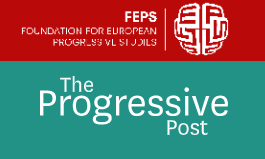Welcome to DU!
The truly grassroots left-of-center political community where regular people, not algorithms, drive the discussions and set the standards.
Join the community:
Create a free account
Support DU (and get rid of ads!):
Become a Star Member
Latest Breaking News
Editorials & Other Articles
General Discussion
The DU Lounge
All Forums
Issue Forums
Culture Forums
Alliance Forums
Region Forums
Support Forums
Help & Search
Missed opportunities, migration and a last chance - crafting a new narrative for Germany's SPD

https://feps-europe.eu/missed-opportunities-migration-and-a-last-chance-crafting-a-new-narrative-for-germanys-spd/

As the heavily defeated SPD prepares to enter a coalition with the CDU, the next four years will be pivotal for both Germany’s democracy and the future of the Social Democrats. To regain their footing, the SPD must focus on defining its own clear and consistent narrative, addressing key social justice issues and progressive values while navigating in a coalition environment. It is worthwhile to remember that the snap election was called because the governing traffic-light coalition could not agree on a common budget. The Liberals had planned to leave the government at least since late summer 2024, calling the date ‘D-day’ in their simulation games. The underlying conflict is a real one: how to stop the dramatic decline in public investment that Germany has suffered from since the 1990s.
However, the question of state financing was just a side note during the campaign. You could easily go on: this election was not about finding a new role in world politics or how to revitalise European solidarity after the post-war world order has collapsed. It was not about joining European forces during a crumbling transatlantic partnership. It was not about how to fight climate change, even though the consequences of the flood in 2021 are still visible in the valley of the river Ahr. It was not about how to protect the public debate from Russian web brigades. It was not about inflation and energy prices. It was not about the dramatic shortage of housing in urban Germany. It was not about how to make the half-done green transition a full success. It was not about a fair education system or lifting Germany’s full potential. It was not at all about any positive vision of what Germany could be in 2030.
The three most important issues of the election campaign: migration, migration, migration
Instead, the most important issue was migration. Not in the sense of integrating migrants into the labour market or society, nor in the sense of how the newly agreed Common European Asylum System could work. The debate was mainly about how to send criminal and irregular immigrants back home more quickly. The media contributed to this focus, and attacks by people with migration backgrounds fuelled the debate. Most media coverage was on migration. In short, the whole campaign was a gift to the far-right AfD. Even if parties positioned themselves against the migration policies of the AfD, the far right remained the central angle of the debate. Ever since 2015, the party has successfully built up a fear-based narrative, suggesting that immigration, particularly from Muslim-majority countries, undermines Germany’s identity, wealth and security.
Switch off/switch on: why this does not work when it comes to public discourse
Chancellor Olaf Scholz was the most prominent face of the Social Democratic campaign, which is not as self-evident as you might think. Four years ago, he won the last campaign with his umbrella strategy, claiming respect for everyone, a slogan that successfully reached out to different groups of the electorate. During his three years as chancellor, Scholz’s strategy was to present himself as a calm and honest broker within his fragile three-party coalition. Again and again, he tried to bridge the growing differences between the Greens and Liberals. One could give him some credit: he was able to stabilise the centrifugal forces of this unlikely coalition for three years. But the price was high: the position of the SPD and its central figure was almost absent in public discourse. Scholz was associated with the permanent struggle in his government, lacking leadership and a clear vision of why the SPD should lead the government. It was hardly possible to identify his core political projects.
snip
1 replies
 = new reply since forum marked as read
Highlight:
NoneDon't highlight anything
5 newestHighlight 5 most recent replies
= new reply since forum marked as read
Highlight:
NoneDon't highlight anything
5 newestHighlight 5 most recent replies
Missed opportunities, migration and a last chance - crafting a new narrative for Germany's SPD (Original Post)
Celerity
Mar 1
OP
somsai
(99 posts)1. It's the same in most of Europe, the US, Japan, Korea, Australia, and NZ
Politicians need to go to where the voters are, or the voters find someone else, and as we've seen with Trump, that someone else often comes with nut case baggage.